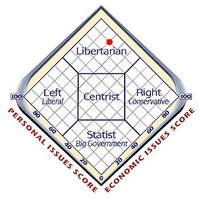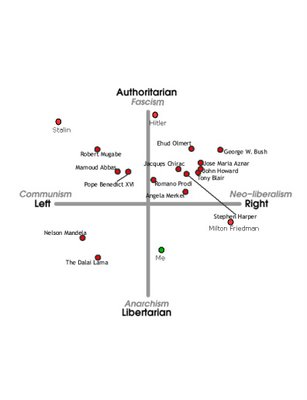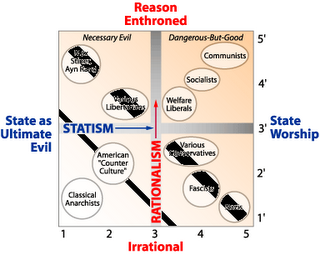 It's quite possible there has been a rightward shift in my thinking as I have aged, but even so, I think the one-dimensional left-right system is wholly inadequate. I'm much more intrigued by the various attempts to plot politics on a two-dimensional landscape. Popular versions of these two-dimensional systems typically plot a social axis (from completely deregulating sex and drugs on one end, to having the government in your bedroom on the other) and an independent economic axis (from free market to government-controlled economy). The first time I saw this was taking the "World's Smallest Political Quiz", which asks 10 quick agree/maybe/disagree questions, and plots you on such a two-dimensional political map. It's kind of quick-and-dirty, and I don't always plot exactly the same, but I tend to be a libertarian with centrist leanings. You can see my score at right. This quiz is sponsored by a group called the Advocates for Self-Government, whose goals include promoting libertarian ideals and awareness, and changing the dominant but inadequate one-dimensional left-right model of politics. They claim that 5 million people have taken their quiz, and 35% of them score as libertarians. Their theory is that many people have libertarian ideals to some extent, but don't think of themselves as libertarians. I think this is probably true for two reasons. One, touted by the Advocates, is that libertarianism doesn't neatly fit in the left-right paradigm which is how most people think, so many aren't even aware of it as an option. Another reason (not put forward by the Advocates) is that the Libertarian Party in practice tends to put up a lot of crackpots for election, and even many people who recognize themselves as "small-l" libertarian in philosophy eschew the capital-L Libertarian Party. I think the quiz is roughly accurate, in that I do find much more resonance with libertarian philosophy than with either the Left or the Right. And I also like that the way they've oriented their quadrants, libertarianism is neither left nor right, but "upword".
It's quite possible there has been a rightward shift in my thinking as I have aged, but even so, I think the one-dimensional left-right system is wholly inadequate. I'm much more intrigued by the various attempts to plot politics on a two-dimensional landscape. Popular versions of these two-dimensional systems typically plot a social axis (from completely deregulating sex and drugs on one end, to having the government in your bedroom on the other) and an independent economic axis (from free market to government-controlled economy). The first time I saw this was taking the "World's Smallest Political Quiz", which asks 10 quick agree/maybe/disagree questions, and plots you on such a two-dimensional political map. It's kind of quick-and-dirty, and I don't always plot exactly the same, but I tend to be a libertarian with centrist leanings. You can see my score at right. This quiz is sponsored by a group called the Advocates for Self-Government, whose goals include promoting libertarian ideals and awareness, and changing the dominant but inadequate one-dimensional left-right model of politics. They claim that 5 million people have taken their quiz, and 35% of them score as libertarians. Their theory is that many people have libertarian ideals to some extent, but don't think of themselves as libertarians. I think this is probably true for two reasons. One, touted by the Advocates, is that libertarianism doesn't neatly fit in the left-right paradigm which is how most people think, so many aren't even aware of it as an option. Another reason (not put forward by the Advocates) is that the Libertarian Party in practice tends to put up a lot of crackpots for election, and even many people who recognize themselves as "small-l" libertarian in philosophy eschew the capital-L Libertarian Party. I think the quiz is roughly accurate, in that I do find much more resonance with libertarian philosophy than with either the Left or the Right. And I also like that the way they've oriented their quadrants, libertarianism is neither left nor right, but "upword". A more sophisticated (and less American-centric) two-dimensional map can be found at The Political Compass, whose quiz is not the smallest (it's six web pages of questions) but still only takes about 10 minutes. Their map is essentially the same, but rotated 135 degrees, and with different labels on the axes. In this assessment, I turn out to be in the libertarian quadrant (the green dot in the lower left), with a "social latitude" of -4.87 (on a 10-point scale, with positive being authoritarian) and an "economic longitude" of 1.13 (with positive being free market). Interestingly, they have plotted a number of world leaders, and most of the western world ends up in the "northeast" (free-market-oriented statists), except for the Netherlands, Sweden, Finland, and Denmark, who end up east but slightly south of the equator. Practically all US politics is in the "northeast", as are the New Labour and Conservatives in the UK, but they also get the Liberal Democrats in the southeast, the Greens in the southwest, and the British Nationals in the northwest. Me, I'm in the same quadrant as Milton Friedman and Ayn Rand, but with communitarian sympathies pulling me closer to the "prime meridian" (beyond which lay Gandhi and the Dalai Lama).
A more sophisticated (and less American-centric) two-dimensional map can be found at The Political Compass, whose quiz is not the smallest (it's six web pages of questions) but still only takes about 10 minutes. Their map is essentially the same, but rotated 135 degrees, and with different labels on the axes. In this assessment, I turn out to be in the libertarian quadrant (the green dot in the lower left), with a "social latitude" of -4.87 (on a 10-point scale, with positive being authoritarian) and an "economic longitude" of 1.13 (with positive being free market). Interestingly, they have plotted a number of world leaders, and most of the western world ends up in the "northeast" (free-market-oriented statists), except for the Netherlands, Sweden, Finland, and Denmark, who end up east but slightly south of the equator. Practically all US politics is in the "northeast", as are the New Labour and Conservatives in the UK, but they also get the Liberal Democrats in the southeast, the Greens in the southwest, and the British Nationals in the northwest. Me, I'm in the same quadrant as Milton Friedman and Ayn Rand, but with communitarian sympathies pulling me closer to the "prime meridian" (beyond which lay Gandhi and the Dalai Lama). An earlier and more philosophical variant on the two-dimensional political landscape is called the Pournelle Chart, where the axes are "statism" (confidence in centralized government) and "rationalism" (confidence in planned solutions to social problems). The "statism" axis can plotted neatly on maps like The Political Compass, but the "rationalism" axis is a different dimension with no clear correspondent on the other maps. Pournelle labels the poles of "rationalism" as "reason enthroned" and "irrational", although as the Wikipedia article notes, "irrational" is not meant in a pejorative sense. As I understand it, better labels for the poles might be "idealist" and "sceptic". I've not seen any accompanying quiz that plots people on the Pournelle Chart, and I'm less certain where I'd land here. I'm probably somewhat west of center on the "statism" scale, and conflicted on the "rationalism" scale. Idealism runs deep in me, but I've grown to appreciate pragmatism more as I've aged, and I think I'd be relatively equatorial (probably somewhat north or south on different issues). Interestingly, Pournelle locates "various libertarians" in his northwest quadrant. However, most of the "small-l" libertarians I know and respect would be fairly west and fairly south, where Pournelle has put "classical anarchists" and the "American Counter-Culture". Indeed, one such libertarian I know and respect calls himself a "minarchist", and several of them feel the pull of the classical conservative Burke (whom Pournelle puts at the far south, but neither east nor west).
An earlier and more philosophical variant on the two-dimensional political landscape is called the Pournelle Chart, where the axes are "statism" (confidence in centralized government) and "rationalism" (confidence in planned solutions to social problems). The "statism" axis can plotted neatly on maps like The Political Compass, but the "rationalism" axis is a different dimension with no clear correspondent on the other maps. Pournelle labels the poles of "rationalism" as "reason enthroned" and "irrational", although as the Wikipedia article notes, "irrational" is not meant in a pejorative sense. As I understand it, better labels for the poles might be "idealist" and "sceptic". I've not seen any accompanying quiz that plots people on the Pournelle Chart, and I'm less certain where I'd land here. I'm probably somewhat west of center on the "statism" scale, and conflicted on the "rationalism" scale. Idealism runs deep in me, but I've grown to appreciate pragmatism more as I've aged, and I think I'd be relatively equatorial (probably somewhat north or south on different issues). Interestingly, Pournelle locates "various libertarians" in his northwest quadrant. However, most of the "small-l" libertarians I know and respect would be fairly west and fairly south, where Pournelle has put "classical anarchists" and the "American Counter-Culture". Indeed, one such libertarian I know and respect calls himself a "minarchist", and several of them feel the pull of the classical conservative Burke (whom Pournelle puts at the far south, but neither east nor west).A friend once told me that "if you're not a liberal in your 20's, you have no heart, but if you're not a conservative in your 40's, you have no brain". At the time I didn't believe him, but I was in my 20's then. Now I'm in my 40's and it's seeming more credible. I do think it helps to be a certain age to appreciate Burke's pragmatism regarding human nature and his scepticism of sweeping idealistic reforms. (Burke is, like fine whisky and cigars, a taste I thought I would never acquire, until I did.) But my appreciation for conservative philosophy has not diminished in any way my appreciation for liberal philosophy. One of the revelations of breaking out of the one-dimensional political thinking is the discovery that communism is not the opposite of fascism, rather they are orthogonal. Similarly, conservative is not the opposite of liberal, and in fact at this point in history, it is perfectly reasonable to be both liberal and conservative. I must point out here that I mean "liberal" in the classical sense (think Jefferson, Madison, Locke, and Mill) and I mean "conservative" in the classical sense (think Burke and Hume), which are often far from the way these terms have been abused in current American discourse (where "liberal" is the straw-man target of Ann Coulter's polemic performance art, and "conservative" is mindlessly equated with Republican pork programs and Christianist agendas). Insofar as a conservative attitude means a reluctance to make sweeping changes to proven social institutions, and since we Americans now have a two century track record of a constitutional republic based on liberal principles that has served us well, it seems to me perfectly reasonable to say that I am both a liberal and a conservative. Perhaps I have a heart and a brain after all.

4 comments:
Tom --
If you wanted to place me on the Pournelle chart, I would say that I fall very close to Ayn Rand, who was of formative influence on my political beliefs. I consider reason to be the very highest human virtue, the one from which all others flow.
Interesting post, though. Pournelle was a new one on me, to tell the truth.
As to the old quote, "if you're not a liberal in your 20's, you have no heart, but if you're not a conservative in your 40's, you have no brain" ...I might just be on my way to proving that I have neither. I would have identified as a conservative-leaning libertarian in my early to mid-twenties; now, however, I increasingly see myself as a part of the left -- if only because American conservatives have changed so much in the meantime.
Jason Kuznicki
Please don't get the impression that all libertarian activists are with the Libertarian Party. If you find yourself agreeing with libertarian views, but are turned off by some of the extremism of the LP, you may be in fact a libertarian Republican. Check out the Republican Liberty Caucus at www.rlg.org.
And for a list of elected libertarians nationwide there's www.mainstreamlibertarian.com
I suspect you're a "mainstream libertarian" anyways.
You realize the "political compass" was invented by Libertarians, right? Notice how it puts historically very bad things on the exact opposite from Libertarianism, which is at the top?
Don't let a biased Internet quiz tell you which "political party" you belong to ("ours!") Of course a quiz put together by Libertarians is going to tell you you're Libertarian.
Think for yourself. That's the only political philosophy I'll ever subscribe to. Judge each issue independently, not by where it falls on the "party line".
One thing about "common sense" sayings is that they are rarely common or make any sense. This saying
"if you're not a liberal in your 20's, you have no heart, but if you're not a conservative in your 40's, you have no brain"
is similar to others, like, "Great minds think alike". Even a cursory understanding of history or a critical reading of the history of ideas shows how false they are. Great thinkers are great because they thought differently. Others may agree or come to similar conclusions, but the thought processes are generally quite different. The same with the statement used here. More than likely these types of statements are coined by a person who gave up the fight or was a second-class thinker and couldn't handle it. While there is comfort in numbers, there is rarely uniqueness.
Post a Comment